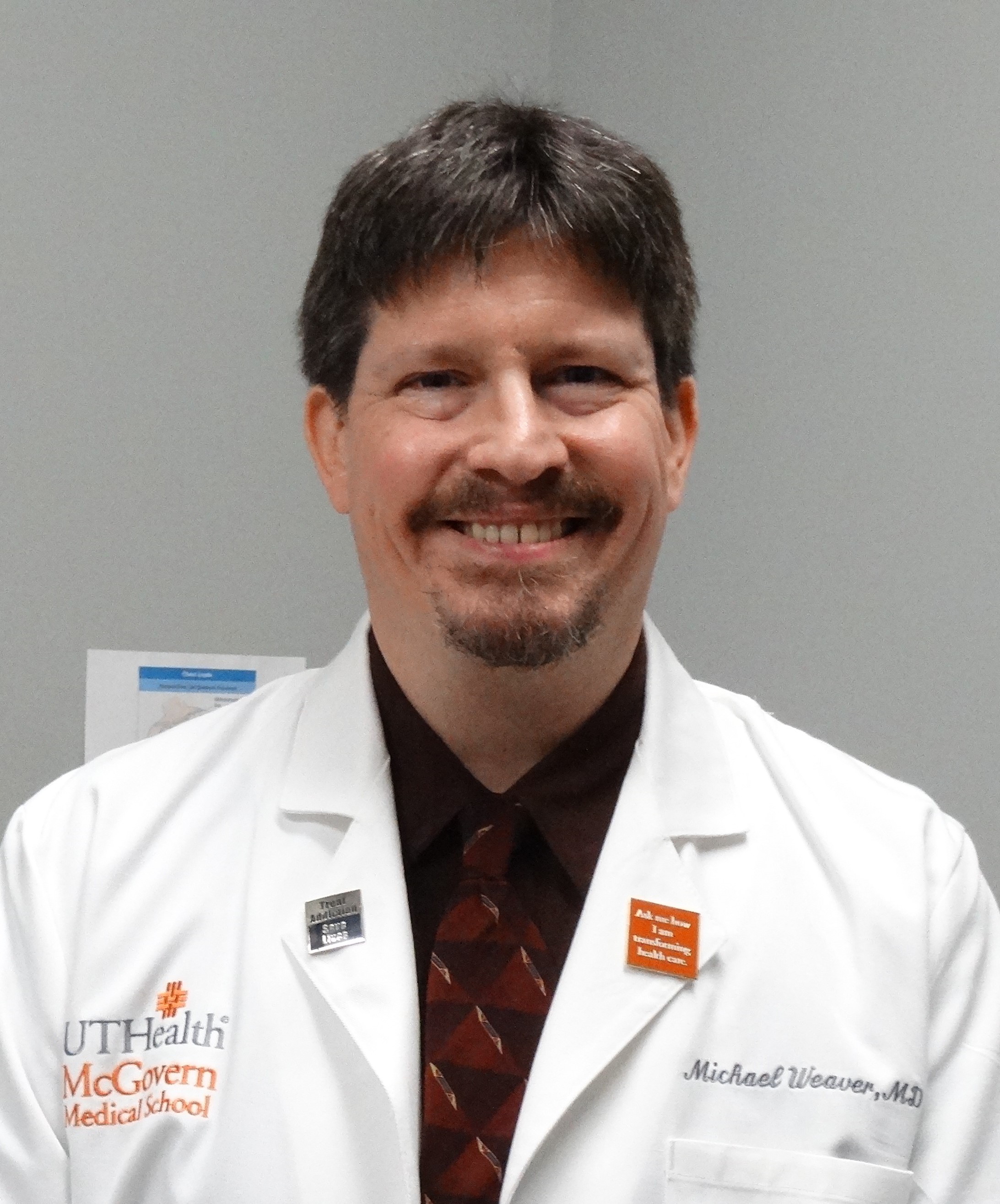Michael F. Weaver, MD, DFASAM

Professor
Louis A. Faillace, MD, Department of Psychiatry & Behavioral Sciences
Medical Director, Center for Neurobehavioral Research on Addiction
McGovern Medical School at UTHealth Houston
Email: [email protected]
Phone: 713-486-2558
Teaching Philosophy
I have enjoyed teaching since I started tutoring younger students while in high school. I have been involved in teaching throughout my career and since joining the McGovern Medical School (MMS) faculty in 2014. Several current members of the MMS Academy of Master Educators have been my teaching role models and provided valuable assistance. I thoroughly enjoy engaging in different teaching roles.
Curiosity is an essential part of learning and should be encouraged. I encourage learners to ask questions about the material I am presenting, even if we go off on a tangent and don’t cover everything I had planned. I want the learning environment to support inquiry wherever that may take us. Sometimes these questions and tangents lead to wonderful discussions and new insights. I believe that there is no such thing as a stupid question: the only stupid question is one that does not get asked, because that is a missed opportunity for learning.
Providing feedback is essential. I always have an exit interview with students, many of whom said that no other attendings did that with them. I help my learners to have realistic expectations based on their strengths and past performance. I turn, I ask students to give me feedback on how I can improve, including what they liked and disliked about how I teach in that clinical setting. I employ self-reflection when I incorporate feedback, which has helped me grow as an educator.
Dissemination of research findings for formulation of new clinical practice strategies is essential to help patients benefit from advances in scientific knowledge. I have taught and published about translational aspects of research findings to help clinicians incorporate the new findings into routine care for patients. My focus has been on assessment for addiction and ways for clinicians to appropriately address this with their patients. This includes a whole range of substances of abuse, especially those having a major impact on society currently, such as prescription opioids and newer designer drugs.
My mentor taught me that the goal of a teacher/mentor is to elevate students to my level and above. I try to provide my learners with opportunities to learn in different ways as much as possible. I try to seek out venues for collaboration on different projects, including manuscripts, joint lectures, conferences, and research grants. I help my mentees with introductions to leaders in the field whenever possible. I also allow them to develop their own style and enhance their own strengths, which may be different from my own. Many times those I am teaching end up helping me to learn something new.
Areas of Expertise/Interests
- Addiction Medicine
- Substance Use Disorders
- Pain Management
- Controlled Substance prescribing
- Motivational Interviewing
- Medical Ethics
Past and Current Educational Activities
Medical Students
- Intersession lecture on Substance Abuse to M1 students
- Small group ethics discussions leader for M1 students
- Lectures in M2 Behavioral Science course on addiction
- Problem-Based Learning group leader, M1 and M2 students
- Small group psychiatric interviewing sessions for M2 Behavioral Science
- Small group teaching of the Mental Status Exam sessions for M1 and M2 Behavioral Science
- Team-Based Learning group leader in M3 Psychiatry Clerkship
Residents
- MMS Psychiatry Residency Program Evaluation Committee
- Didactic lectures to Psychology interns in the UT Department of Psychiatry, multiple topics, 1-2 lectures annually
- Monthly didactic Substance Abuse topics lecture series to Psychiatry residents
- Motivational Interviewing workshop for Psychiatry residents
Clinical Fellows
- Didactic lectures to UT Department of Psychiatry Child and Adolescent Psychiatry fellows, multiple topics, 1-2 lectures annually
- Motivational Interviewing workshop for Child and Adolescent Psychiatry fellows
Honors/Awards/Appointments
- Alpha Omega Alpha Honor Medical Society
- McGovern Medical School Dean’s Teaching Excellence Awards
- Award for appreciation of leadership as Chair of the Certification Examination Committee of the American Board of Addiction Medicine, 2017
- Member of the Standard Setting Panel for the National Board of Medical Examiners evaluation of the U.S. Medical Licensing Exam (USMLE) Part 2 Clinical Knowledge, 2018
- Participated in the Safety in Opioid Prescribing Test Item Bank Development project for the American Board of Medical Specialties, 2018
- Appointed to the Board of Directors of the American Board of Preventive Medicine, 2019
Selected Publications
- Weaver, M.F., Jarvis, M.A.E., Schnoll, S.H.: Role of the primary care physician in problems of substance abuse. Archives of Internal Medicine, 159: 913-924, 1999.
- Weaver, M.F., Heit, H., Savage, S., Gourlay, D.: Clinical Case Presentation: Chronic Non-Malignant Pain. Journal of Addiction Medicine, 1(1): 11-14, 2007.
- Weaver, M.F.: Prescribing medications that have potential for abuse. Journal of Clinical Outcomes Management, 16(4): 171-179,
- Weaver, M.F., Hopper, J.A., Gunderson, E.W.: Designer Drugs 2015: Assessment and Management. Addiction Science & Clinical Practice 2015; 10:8.
- Clark, C.D., Weaver, M.F.: Balancing beneficence and autonomy. American Journal of Bioethics 15(7):62-63, 2015.
- Weaver, M.F.: Addiction Treatment, Newburyport, MA: Carlat Publishing, 2017.
- Weaver, M.F., Jones, H.E., Wunsch, M.J.: Alcohol and Other Drug Use During Pregnancy: Management of the Mother and Child. In S. Miller, D. Fiellin, R. Rosenthal, R. Saitz (Eds.), Principles of Addiction Medicine, 6th, Chevy Chase, MD: American Society of Addiction Medicine, Inc., pp 1314-1332, 2019.